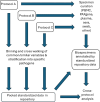The infectious diseases clinical research program acute respiratory infection repository protocol: Opportunities to understand current and future epidemics
- PMID: 40700358
- PMCID: PMC12286355
- DOI: 10.1371/journal.pone.0317065
The infectious diseases clinical research program acute respiratory infection repository protocol: Opportunities to understand current and future epidemics
Abstract
Background: Acute respiratory infections (ARI) are a major cause of morbidity and lost workdays in both military and non-military populations. To better understand these infections and their outcomes, the Infectious Diseases Clinical Research Program has enabled nine major ARI clinical research protocols in the last decade, including observational studies and trials, spanning emerging and reemerging ARI threats including Severe Acute Respiratory Syndrome Coronavirus 2, influenza, adenovirus, entero/rhinovirus, human metapneumovirus, respiratory syncytial virus, and other pathogens. These protocols have resulted in epidemiological, clinical and laboratory data and biospecimens from over 26,000 participants, most of whom were beneficiaries of a geographically distributed Military Health System.
Methods: The Acute Respiratory Infection Repository Protocol establishes a unique Department of Defense (DoD) research resource through the pooling of data and specimens from nine ARI protocols into a master, standardized database with a linked specimen repository. This will enable further targeted scientific questions in participant-level pooled meta-analyses and will serve as an on-demand repository for rapid assay development, sample size estimations for prospective studies, and observational study/clinical trial design (including as part of future rapid pandemic research response). Accordingly, the objectives and study design of this protocol are broad. This protocol will allow analyses on outcomes including: (i) short-term ARI outcomes such as hospitalization, work days lost, symptom severity and duration; (ii) post-acute ARI outcomes, including persistence of symptoms, return-to-health, post-ARI medical encounters; (iii) vaccine effectiveness for Coronavirus disease 2019 (COVID-19), influenza, and adenovirus vaccines; (iv) ARI infection and vaccination elicited immune responses (humoral, T-cell, other); (v) therapeutic effectiveness of COVID-19 and influenza antivirals (acute symptoms, hospitalization, post-acute sequelae); (vi) effectiveness of non-pharmaceutical interventions (e.g., masking) against infection; (vii) prognostic and mechanistic host viral biomarkers which correlate with the above outcomes; (viii) ARI diagnostic assay validity and performance. This repository protocol is inherently broad in scope; the collation of standardized data and phenotype-linked specimens is a fundamental, primary objective.
Discussion: This protocol will support statistical and laboratory analyses, including activities related to rapid epidemic response such as assay development and rapid sample size calculations for clinical trials. A series of more specific scientific questions from current and future collaborators will leverage this joint database and specimen repository; these questions will target important aspects of ARI infection, transmission, outcomes, and treatment. Future protocols (and ongoing data from existing IDCRP protocols) will be added to this collaborative repository protocol.
Copyright: This is an open access article, free of all copyright, and may be freely reproduced, distributed, transmitted, modified, built upon, or otherwise used by anyone for any lawful purpose. The work is made available under the Creative Commons CC0 public domain dedication.
Conflict of interest statement
Potential conflicts of interest. S. D. P., T. H. B., D.R.T, and M.P.S. report that the Uniformed Services University (USU) Infectious Diseases Clinical Research Program (IDCRP), a US Department of Defense institution, and the Henry M. Jackson Foundation (HJF) were funded under a Cooperative Research and Development Agreement to conduct an unrelated phase III COVID-19 monoclonal antibody immunoprophylaxis trial sponsored by AstraZeneca. The HJF, in support of the USU IDCRP, was funded by the Department of Defense Joint Program Executive Office for Chemical, Biological, Radiological, and Nuclear Defense to augment the conduct of an unrelated phase III vaccine trial sponsored by AstraZeneca. Both of these trials were part of the US Government COVID-19 response. Neither is related to the work presented here.
Figures
Similar articles
-
Physical interventions to interrupt or reduce the spread of respiratory viruses.Cochrane Database Syst Rev. 2023 Jan 30;1(1):CD006207. doi: 10.1002/14651858.CD006207.pub6. Cochrane Database Syst Rev. 2023. PMID: 36715243 Free PMC article.
-
Measures implemented in the school setting to contain the COVID-19 pandemic.Cochrane Database Syst Rev. 2022 Jan 17;1(1):CD015029. doi: 10.1002/14651858.CD015029. Cochrane Database Syst Rev. 2022. Update in: Cochrane Database Syst Rev. 2024 May 2;5:CD015029. doi: 10.1002/14651858.CD015029.pub2. PMID: 35037252 Free PMC article. Updated.
-
Adapting COVID-19 research infrastructure to capture influenza and respiratory syncytial virus alongside SARS-CoV-2 in UK healthcare workers winter 2022/23 and beyond: protocol for a pragmatic sub-study.NIHR Open Res. 2024 Nov 5;4:1. doi: 10.3310/nihropenres.13517.3. eCollection 2024. NIHR Open Res. 2024. PMID: 39931702 Free PMC article.
-
Signs and symptoms to determine if a patient presenting in primary care or hospital outpatient settings has COVID-19.Cochrane Database Syst Rev. 2022 May 20;5(5):CD013665. doi: 10.1002/14651858.CD013665.pub3. Cochrane Database Syst Rev. 2022. PMID: 35593186 Free PMC article.
-
Antibody tests for identification of current and past infection with SARS-CoV-2.Cochrane Database Syst Rev. 2022 Nov 17;11(11):CD013652. doi: 10.1002/14651858.CD013652.pub2. Cochrane Database Syst Rev. 2022. PMID: 36394900 Free PMC article.
References
MeSH terms
LinkOut - more resources
Full Text Sources


